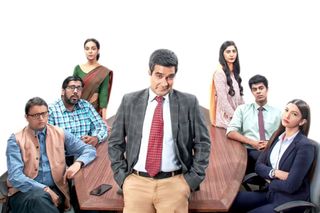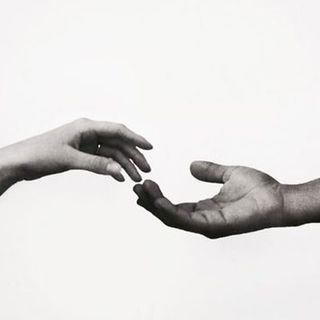
Do Shows Like ‘The Office’ Have a Place in a Post #MeToo World?
Hotstar’s ‘The Office’ Hindi reboot brings back a beloved — sexual harasser?

The Office has been a revered topic of discourse, with new fans cropping up even 14 years after its debut. It restructures the mundane workspace into something beyond piles of paperwork, thus becoming a token of hope on Monday mornings. However, despite its good moments, the show is a token of a very problematic socio-political past. Now, Hotstar has decided to capitalize on India’s large fan following of The Office and create a literal copy of the U.S. show, only this time, with Indian characters and a few Indian references thrown in. Early reviews of the Hotstar remake have lambasted it for being a literal translation of the American script.
While fans are predictably disappointed that the show is a literal copy, the critique lost in the noise is — should streaming platforms even consider bringing back shows that normalize sexual harassment at the workplace? The Hotstar remake is an unnecessary throwback to an old show that puts the spotlight back on comedic depictions of sexual harassment at the workplace. In a post #MeToo era, where there have been multiple calls to hold men in power accountable, dated shows like The Office stick out like a sore thumb and reinforce negative stereotypes of workplace harassment that could hurt women at work.
The remake tries hard to show that nothing has changed since 2004. It nullifies the ongoing turnover of regressive mentality that #MeToo began. The first episode, in both the U.S. and Indian versions, observes the boss introducing the receptionist, adding that she used to be prettier — in front of her. In episode eight, mirroring the U.S. version’s second episode from the second season, the Michael Scott character, Jagdeep Chadda, apologizes for body shaming the saleswoman Sarlaji, asserting that she gives him an erection. Scott/Chaddha’svilification and dismissal of the fictional company’s HR executive Toby/Madhukar— i.e. the individual supposed to keep harassment in check — in both versions signals how little he cares for office decorum.
Related on The Swaddle:
Many Cases of Sexual Harassment Never Make It to Companies’ Internal Committees
While The Office does hold Michael Scott and his Indian counterpart Jagdeep Chadda accountable via other characters, who break the fourth wall to show their disgust, there’s no serious protest registered against the harassment that occurs. Lips are pursed, looks are thrown and there’s the occasional vacation given to the recipient of the harassment (in the episode called Gay Witch Hunt) —and that’s it. A vile, sexist traveling salesman character, Todd Packer, is mirrored in the Indian version as Prem Chopra, and their existence in the narrative is to merely shift focus from Scott/Chadda’s misogyny, as if to say, “Look, there are worse people who exist.” While the show ensures plausible deniability because there’s a clear depiction of disapproval, a remake of a decade-old show that relies on workplace harassment for humor without any reference to how society feels about workplace harassment now is just dated and exhausting.
Workplace harassment, unlike The Office, is no relic of the past, even though #MeToo helped reintroduce the conversation around it. According to a survey by Local Circles, 50% of the respondents who have faced office harassment said that the episode took place during regular office hours. Yet, as many as 78% of them never reported it to HR. The silence around workplace harassment depicted in The Office sets a terrible example for its fans — especially those who haven’t been in a workplace before and may be absorbing subconsciously that this is how full-time jobs and colleagues are.
In the 21st century, everything is political. Our shows are no longer narratives that exist in isolation, but ones which actively shape our identity and outlook. In “Reel to Real,” bell hooks writes, “…identity is always about representation … when they wanted white women to get into the workforce because of the world war … they started having a lot of commercials … redoing the female image (to make working look feminine). So what we see is that the mass media, film, TV, all of these things, are powerful vehicles for maintaining the kinds of systems of domination we live under.”
Related on The Swaddle:
In an Esquire profile published in 2018, Steve Carell (the actor who played Michael Scott in the American version of The Office) said, “A lot of what is depicted on that show is completely wrong-minded. That’s the point, you know? But I just don’t know how that would fly now.”
The audience has evolved, become more educated, and hence has a higher “awareness of offensive things today.” In this socio-political climate, why do we, as an informed, privileged audience, stand by regressive narratives? The Office was a product of its time; one that thrived on an audience that dismissed its misogyny as the inevitable reality of the workspace, or worse still, found a mirror to their own terrible experiences in Michael Scott’s harassment episodes. The reboot of the show is only proof that we are still willing to laugh at the cost of the marginalized. After all, if Jagdeep Chadda wearing an “F.B.I (Female Body Inspector)” t-shirt is still considered a joke fit for the screen, then the graph of progress in India lies as flat as that joke falls.
Meghalee Mitra writes like her life depends on it. She smells books for a living, and believes that there is magic in the alleyways of her Kolkata neighborhood. Among other genres, she also writes about Netflix in a secret attempt to justify the addiction. When taking a break from hyper anxiety, and bunjee jumping on patriarchy, she also likes to breathe.
Related


Why Childhood Memories Are Vivid for Some, Hazy for Others
